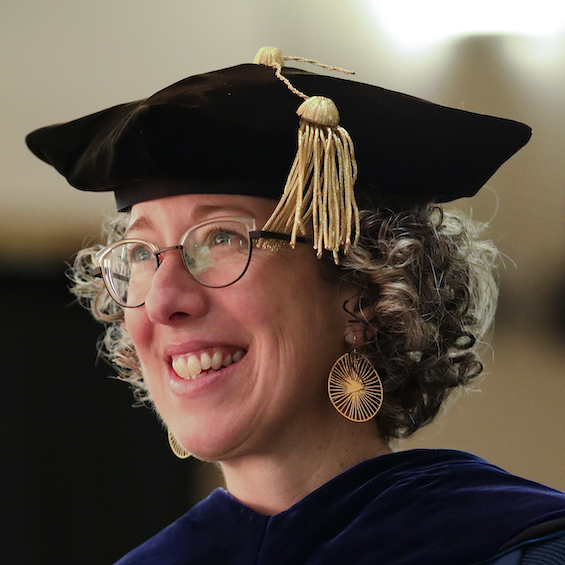Dr. Jeannine Uzzi, Provost and Executive Vice President for Academic and Student Affairs at the University of Southern Maine, is the 2020 recipient of the Michael C. Holen Pacesetter Award presented by the National Academic Advising Association (NACADA) as part of its Global Awards Program for Academic Advising.

The honor recognizes executive officers, provosts and academic or student affairs officers who exemplify a commitment to academic advising and are true advocates for advising, students and advisors across their institution. Pacesetters uphold the NACADA Core Values on their campuses and empower advisors to do the same. The award was named for Michael C. Holen, a Kansas State University College of Education Dean Emeritus, for his tremendous support of academic advising throughout his career.
In presenting the award at NACADA’s 2020 virtual conference attended by nearly 2,300 higher education professionals this fall, Dr. Erin Justyna, Director of the Center for Transformative Undergraduate Experiences at Texas Tech University, lauded Uzzi’s “history of supporting student success through excellent teaching, advising, mentorship, and outreach.”
“When she became provost at USM in 2015, she made clear her aspiration to be known as the advising provost and pursued a number of initiatives intended to enhance the quality of USM’s advising practice,” Justyna said.
Citing those who nominated Uzzi, Justyna said this year’s Pacesetter Award winner began her tenure as the advising provost by joining USM’s director of academic advising in holding university-wide meetings with faculty to emphasize the importance of high-quality academic advising to the student experience.
Justyna also noted Uzzi’s desire to become trained in how to conduct a university-standard 90-minute individual orientation advising appointment “to understand their intricacies as well as their influence on the student experience.”
“The combination of her understanding, passion, and commitment to academic advising is paramount to her work,” Justyna said.
In her remarks, Uzzi made clear that she received the award and recognition of the university’s success with academic advising on behalf of USM’s academic advising team.
“In my time as provost at USM, I have learned to empower people to be creative, to support good ideas when they came across my desk, and to help people implement their good ideas,” she said. “I learned these lessons in ‘provosting,’ in part, from Dr. Beth Higgins, USM’s Director of Academic Advising and the person who nominated me for this award.”
Uzzi said that when Higgins, “brings me an idea, a request, even a barrier she has identified, the very best thing for me to do and for the institution, is to support her excellent instincts and put her good ideas into motion. When it comes to empowering people, recognizing good ideas, and supporting initiatives, Beth and the Advising Team make my job easy — while their jobs are far from it.”
Uzzi also encouraged the virtual audience to understand the importance of advising as an act of social justice.
“Academic advising is, by definition, high-touch, frontline work, in which students get that precious one-on-one time. This is exponentially more critical for first-generation students and for students of color than for students who arrive on campus with privilege in hand.”
In closing, Uzzi said USM’s recent significant gains in retention and graduation rates are a reflection of academic advisors’ strong commitment to the university’s service promise to be student focused every day.
“These victories, which are so critical for USM and the students we serve, are driven in large part by USM’s academic advisors and their attention to excellence in advising,” she said.
Before becoming provost at USM, Uzzi spent 16 years as a classics professor, first at Whitman College in Walla Walla, Wash., and later at USM. She also served briefly as Director of Faculty Programs at the Associated Colleges of the South in Atlanta, Ga. She holds a B.A. in classical languages from Hamilton College and a Ph.D. in classical studies from Duke University.
Since 1983, NACADA has honored individuals and institutions making significant contributions to the improvement of academic advising. The goal of NACADA is to promote quality academic advising and professional development of its membership to enhance the educational development of students.
NACADA’s membership has grown to over 14,000 faculty, professional advisors, administrators, counselors, and others in academic and student affairs concerned with the intellectual, personal and vocational needs of students. In addition, NACADA is the representative and advocate of academic advising and those providing that service to higher education.

